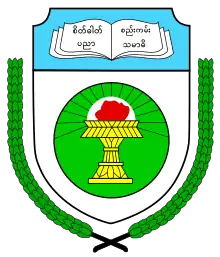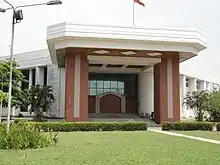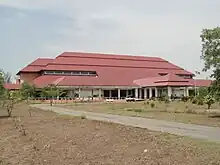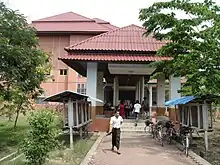Dagon University
Dagon University (Burmese: ဒဂုံ တက္ကသိုလ် [dəɡòʊɰ̃ tɛʔkəθò]), located in North Dagon, Yangon, is one of the largest universities in Myanmar. The university, established in 1993, offers bachelor's and master's degrees in liberal arts and sciences to full-time, part-time and online students. Dagon University also offers a full-time four-year law degree program. The university's 1,582-acre (6.40 km2) campus in the outskirts of Yangon is one of the largest campuses in the country.[1]
ဒဂုံ တက္ကသိုလ် | |
 Seal of Dagon University | |
| Motto | Born to be the outstanding generation |
|---|---|
| Type | Public |
| Established | 1993 |
| Rector | Dr.Thar Htun Maung |
| Students | 60,000 |
| Location | 16°54′47″N 96°12′44″E |
| Website | dagonuniversity |
History

Dagon University was opened in 1993 in North Dagon in the northeastern corner of Yangon to serve students from eastern Yangon districts. The move was widely believed to be part of the Burmese military government's plan to disperse university students across many universities and colleges around the country. Students who would have attended Yangon University now have to attend Dagon University or East Yangon University in Thanlyin, southeast of Yangon.[2]

The university and all other arts and science universities in the country were closed down from December 1996 to July 2000, following student demonstrations in Yangon.[2]
Programs
Classified as an Arts and Science university in the Burmese university education system, Dagon University offers bachelor's and master's degree programs in common liberal arts and sciences disciplines. Its regular Bachelor of Arts (BA) and Bachelor of Science (BSc) take four years to complete and honors degree programs BA (Hons) and BSc (Hons) take five years. The law program also takes five years.[3] The university also offers an online program.[1]


| Program | Bachelor's | Master's | Doctorate |
|---|---|---|---|
| Anthropology | BA | MA, M.Res | |
| Archeology | BA | MA, M.Res | |
| Burmese | BA | MA, M.Res | |
| Biochemistry | BSc | ||
| Biotechnology | BSc | ||
| Botany | BSc | MSc, M.Res | |
| Chemistry | BSc | MSc, M.Res | |
| Computer Science | BSc | ||
| Creative Writing | BA | ||
| English | BA | MA, M.Res | |
| Geography | BA | MA | |
| Geology | BSc | MSc, M.Res | |
| History | BA | MA, M.Res | |
| Hydrology | BSc | ||
| Industrial Chemistry | BSc | MSc, M.Res | |
| International Relations | BA | MA, M.Res | |
| Law | LLB | LLM, M.Res | |
| Mathematics | BSc | MSc, M.Res | |
| Meteorology | BSc | ||
| Microbiology | BSc | ||
| Myanmar Studies | BA | ||
| Nuclear Physics | BSc | ||
| Oriental Studies | BA | MA, M.Res | |
| Physics | BSc | MSc, M.Res | |
| Philosophy | BA | MA, M.Res | |
| Psychology | BA | MA, M.Res | |
| Sport Science | BSc | ||
| Zoology | BSc | MSc, M.Res |
Transport
A new 4.96-mile (7.98 km) rail extension was completed in 2006. Trains travel along the 12.21-mile (19.65 km) route from Yangon Central Railway Station to the university, via Togyaunggalay Station, 10 times a day from 5:25am to 5:35pm.[4] About 4000 students use the rail service daily.[5]
Administration
Current
Rectors have included:
- Dr. Thar Htun Maung
- Dr. Nunu Yi (Pro -Rector)
- Dr. Hteik Tin Han (Pro -Rector)
- Dr. Myo Min (Pro -Rector)
List of rectors (1993-present)
- U Kaung Nyut (1993- 1998)
- Dr. Maung Thin (1998- 2004)
- U Kyaw Myint Oo (2005- 2007)
- U Sun (2007- 2011)
- Dr. Hla Htay (2012- 2016)
- Dr. Aye Aye Tun (2011- 2017)
- Dr. Win Maung (2017- 2019)
- Dr. Thar Htun Maung (2021- Present)
International relations
MoU with Dagon University
- BABSEACLE, Australia
- Dharma Gate Buddhist College, Hungary
- University of Calcutta, India
- The School of Oriental and African Studies (SOAS), University of London, UK
- Ritsumeikan Asia Pacific University, Japan
- Ritsumeikan University, Japan
- College of Science and Engineering, Kanazawa University, Japan[6]
- Pukyong National University, South Korea
- Chonbuk National University, South Korea
- Pusan National University, South Korea
- Seoul National University, South Korea
- Mahidol University, Thailand
- Prince of Songkla University, Thailand
- Chiang Mai University, Thailand
- Payap University, Thailand
- King Mongkut's University of Technology Thonburi, Thailand
- Kamphaeng Phet Rajabhat University, Thailand
- Silliman University, Philippines
- Central Philippine University, Philippines
Gallery
 Entrance
Entrance Convocation Hall (ဘွဲ့နှင်းသဘင် အဆောက်အအုံ)
Convocation Hall (ဘွဲ့နှင်းသဘင် အဆောက်အအုံ) Theater Building (စာသင်ဆောင်)
Theater Building (စာသင်ဆောင်) Offices blocks (သင်တန်းရေးရာ)
Offices blocks (သင်တန်းရေးရာ)
References
- "Dagon University Profile" (in Burmese). Archived from the original on 2011-04-30. Retrieved 2008-12-20.
- "Myanmar university classes resume for 1st time in 3 years". Kyodo News International. 2000-07-31.
- "List of Colleges and Universities in and around Yangon". Archived from the original on 2009-01-09. Retrieved 2008-12-20.
- Win Nyunt Lwin (2006-03-20). "Railway link to Dagon University opens". The Myanmar Times. Archived from the original on 2006-11-14.
- Nyunt Win (2006-07-31). "Trains: the coolest way to get to class". The Myanmar Times. Archived from the original on 2006-11-17.
- "INTERNATIONAL".